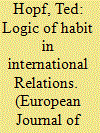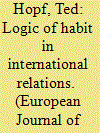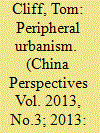|
|
|
Sort Order |
|
|
|
Items / Page
|
|
|
|
|
|
|
| Srl | Item |
| 1 |
ID:
101367


|
|
|
|
|
| Publication |
2010.
|
| Summary/Abstract |
IR theory is dominated by the logics of consequentialism and appropriateness. But Max Weber offered four logics of choice, not just two. Beyond the instrumental rationality of Zweckrationalität and the normative rationality of Wertrationalität are affect and habit. Drawing on Weber, James, Dewey, and Bourdieu, and habit's microfoundations in neurocognitive psychology, I explore the logic of habit and its consequences for several fundamental puzzles in IR theory. The logic of habit necessarily precludes rationality, agency, and uncertainty, and so offers a different interpretation of cooperation, security dilemmas, enduring rivalries, and security communities in international politics. The logic of habit also fills a gap in mainstream constructivism's theorization of intersubjective structures, returning the taken-for-granted lifeworld to the center of attention.
|
|
|
|
|
|
|
|
|
|
|
|
|
|
|
|
| 2 |
ID:
101374


|
|
|
|
|
| Publication |
2010.
|
| Summary/Abstract |
IR theory is dominated by the logics of consequentialism and appropriateness. But Max Weber offered four logics of choice, not just two. Beyond the instrumental rationality of Zweckrationalität and the normative rationality of Wertrationalität are affect and habit. Drawing on Weber, James, Dewey, and Bourdieu, and habit's microfoundations in neurocognitive psychology, I explore the logic of habit and its consequences for several fundamental puzzles in IR theory. The logic of habit necessarily precludes rationality, agency, and uncertainty, and so offers a different interpretation of cooperation, security dilemmas, enduring rivalries, and security communities in international politics. The logic of habit also fills a gap in mainstream constructivism's theorization of intersubjective structures, returning the taken-for-granted lifeworld to the center of attention.
|
|
|
|
|
|
|
|
|
|
|
|
|
|
|
|
| 3 |
ID:
122932


|
|
|
|
|
| Publication |
2013.
|
| Summary/Abstract |
This paper analyses the motives, processes, and effects of urbanisation in Korla, a small but rapidly expanding city in northwest China, where the author conducted over two years of fieldwork. The paper aims to show that the historical monuments of the urban environment are physical manifestations of a stirring, and often violent, program of ideational and socio-economic change that is directed at the periphery and all of its residents - even as some of those residents are also posed as agents of the ongoing transformation.
|
|
|
|
|
|
|
|
|
|
|
|
|
|
|
|
| 4 |
ID:
117882


|
|
|
|
|
| Publication |
2013.
|
| Summary/Abstract |
Ash Amin's Land of Strangers captures succinctly the way the multiplicities of urban life have reshaped our thinking about intercultural relations beyond reified characterisations of ethnicity. Amin draws together an analysis of the ensemble of relations between humans, between humans and the non-human, between work and leisure, and between temporal and spatial relations, to explore our 'society of strangers'. The book provides a productive framework for conceptualising the collaborative commingling that develops across ethnic lines, without losing a sense of imminent conflict, and the pedagogic processes that foster the capacities and habits of living with difference.
|
|
|
|
|
|
|
|
|
|
|
|
|
|
|
|
| 5 |
ID:
159472


|
|
|
|
|
| Summary/Abstract |
Why has U.S. grand strategy persisted since the end of the Cold War? Despite shocks such as the 2008 global financial crisis and the costs of the war in Iraq—circumstances that ought to have stimulated at least a revision—the United States remains committed to a grand strategy of “primacy.” It strives for military preponderance, dominance in key regions, the containment and reassurance of allies, nuclear counterproliferation, and the economic “Open Door.” The habitual ideas of the U.S. foreign policy establishment, or the “Blob,” make U.S. grand strategy hard to change. The United States' military and economic capabilities enable the U.S. government to pursue primacy, but the embedded assumptions of the Blob make primacy the seemingly natural choice. Thanks to the Blob's constraining power, alternative grand strategies based on restraint and retrenchment are hardly entertained, and debate is narrowed mostly into questions of execution and implementation. Two cases—the presidency of Bill Clinton and the first year of the presidency of Donald Trump—demonstrate this argument. In each case, candidates promising change were elected in fluid conditions that we would expect to stimulate a reevaluation of the United States' commitments. In each case, the Blob asserted itself successfully, at least on the grand strategic fundamentals. Change in grand strategy is possible, but it would require shocks large enough to shake the assumptions of the status quo and a president willing to be an agent of change and prepared to absorb the political costs of overhauling Washington's traditional design.
|
|
|
|
|
|
|
|
|
|
|
|
|
|
|
|
|
|
|
|
|